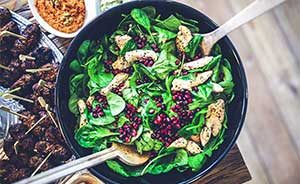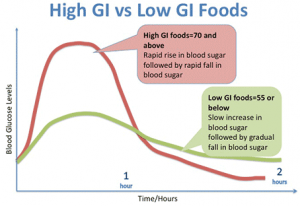VCE is a time you want to be performing at your absolute best. At the very least, you don’t want to be sitting in class with a fuzzy head, unable to think clearly and pretty much wasting your time because you’re not absorbing any information.
Your sleep, nutrition, and exercise all play a role in keeping you alert and ready to learn because each affects your energy levels.
Sleep
On one hand, the less time you spend sleeping, the more time you have for study. On the other, the less you sleep the less you can concentrate and retain information in memory.
Sleep requirements vary from person to person. You might be able to function perfectly with 7.5 hours of sleep every night (including weekends), but I need 8.5. Whatever yours is, don’t underestimate it. Swapping sleep for productivity doesn’t work, so at least allow yourself to sleep in one day a week to catch up on sleep debt.
If you aren’t sure how much sleep you need, I suggest keeping a diary of how much sleep you get each night. Pay particular attention to your sleep on the weekend because it will be longer than usual if you’re not getting enough during the week. If this is the case, your ability to think clearly and stay alert might be more and more impaired as the week goes on.

Apps like SleepBot (Android) and Sleep Cycle (iOS) can make the tracking much easier and automatic than using a diary. As a bonus, you can use these apps to figure out your ‘ideal wake time’. Instead of waking up at the time you set your alarm, you have two options: (1) smart alarm — giving yourself a window of time (say 30 minutes) before the set alarm where the app can wake you up if it thinks you’re in a very light sleep, making for a much gentler wake-up; or (2) sleep debt — with you ‘optimal sleep hours’ and history of your sleep debt each night, you can set the alarm to wake you up after you have caught up on your debt, i.e. a usual 7am wake-up would be a 10am wake-up if you had 3 hours of sleep debt at that point in time.
Memory and Health
Sleep isn’t just important for energy levels and focus. Sleep’s importance for memory formation is well documented. Just ask one of your friends studying psychology.
Also, a lack of sleep can increase your stress response and lower your immune system1. Increasing your susceptibility to getting sick is definitely something to be avoided. Being bedridden or having a stuffy nose (and head) is very counterproductive.
Nutrition
Having the right foods (and drinks) in your diet can help keep you healthy, alert, and remembering your notes.

Energy
Your body uses nutrients to power itself, particularly carbohydrates. The carbohydrates are broken down in to glucose (a type of sugar) travels to your muscles through your blood stream. The GI (glycaemic index) of food measures the how fast and how much a food raises blood glucose levels. Foods with higher index values raise blood sugar more rapidly than foods with lower glycaemic index values do.
Ideally, your foods provide you with a sustained level of energy, represented by a low GI. This way, you don’t experience the spikes in energy from high GI foods that inevitably lead to a crash.
Image source: powerkegcrossfit.com, adapted from gisymbol.com
The American Diabetes Association2 provides the following examples:
- Low GI Foods (55 or less)
- 100% stone-ground whole wheat or pumpernickel bread
- Oatmeal (rolled or steel-cut), oat bran, muesli
- Pasta, converted rice, barley, bulgur
- Sweet potato, corn, yam, lima/butter beans, peas, legumes and lentils
- Most fruits, non-starchy vegetables and carrots
- Medium GI (56-69)
- Whole wheat, rye and pita bread
- Quick oats
- Brown, wild or basmati rice, couscous
- High GI (70 or more)
- White bread or bagel
- Corn flakes, puffed rice, bran flakes, instant oatmeal
- Shortgrain white rice, rice pasta, macaroni and cheese from mix
- Russet potato, pumpkin
- Pretzels, rice cakes, popcorn, saltine crackers
- melons and pineapple
It’s important to stay away from foods and drinks with added sugars, especially energy drinks that have added drugs like caffeine and taurine that lead to a similar crash effect (in addition to other side-effects).
Memory
Certain nutrients have been claimed to boost your memory, such as antioxidants and omega-3 fatty acids. Not enough research has been done to confirm this, though. There is some evidence3 to suggest that eating a diet too high in saturated fats and trans fats can harm your memory. Filling up your diet with unsaturated fats instead is better for you4, which can come from avocado, nuts, needs, and fish.
Exercise
Keeping fit and exercising regularly can help keep your energy levels up. Regular exercise gets your circulatory system pumping oxygen and nutrients around the body, increasing your brain’s access to resources. If you have fatigue symptoms, you’re better off doing some quick exercises than turning to a high GI sugary snack.

In a study published in the journal Psychotherapy and Psychosomatics in 2008, University of Georgia researchers found that inactive folks who normally complained of fatigue could increase energy by 20% while decreasing fatigue by as much as 65% by simply participating in regular, low-intensity exercise.5.
Exercising isn’t just good for your studies because of energy benefits. Regular exercise can lead to increased neuron growth, improved stress coping, improved declarative, spatial, and working memory, and structural and functional improvements in brain structures and pathways associated with cognitive control and memory6.
Needless to say, exercising is good for you in many ways and neglecting it can hurt your school performance.






